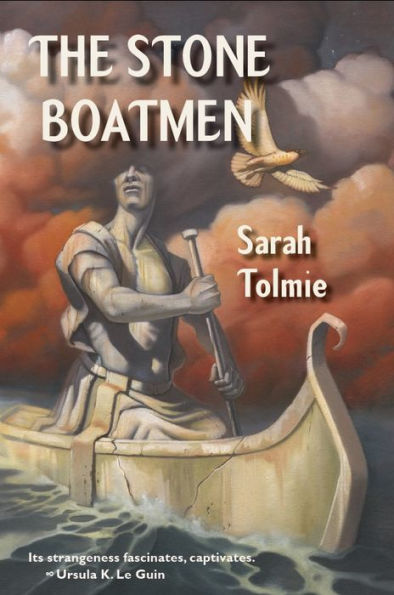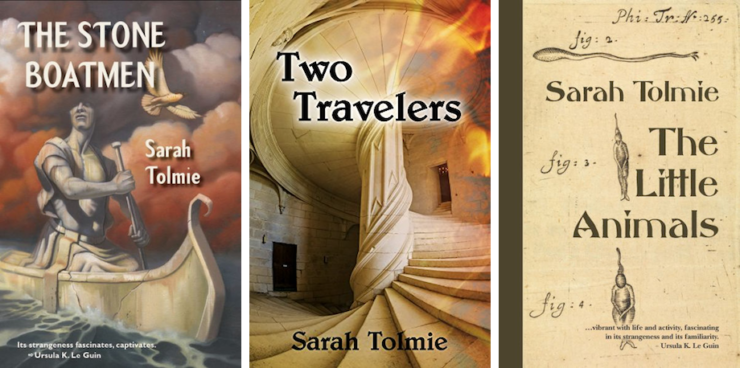I was a bit surprised when in a comment someone mentioned not having heard of Sarah Tolmie. In the spirit of XKCD’s Ten Thousand, let me explain at least a little about who Sarah Tolmie is, and why you should be reading her fiction.
An Associate Professor of English at the University of Waterloo, Tolmie won a 2019 Rhysling Award for “Ursula Le Guin in the Underworld”; the poem was also nominated for an Aurora. Her The Art of Dying was shortlisted for the 2019 Griffin Poetry Award. Unfortunately, poetry isn’t my thing, so let’s move on to prose…
Tolmies’ first published speculative fiction novel was 2014’s The Stone Boatmen. In it, three cities with a forgotten shared past resume contact with each other after ages of isolation. Time has allowed them to develop in very different directions. Tolmie could have told a tale of horrified xenophobia and exploitation. Instead, she took her story in a far more humane direction, weaving tales about the relationships that follow into an unexpectedly intimate short novel. Tolmie’s prose is markedly superior to the norm for speculative fiction.
Buy the Book


The Stone Boatmen
The Stone Boatmen earned a starred review from a member of Publisher Weekly’s faceless legions. Far more significantly, it won glowing accolades from Ursula K. Le Guin, which can be read here:
Certain imaginative novels never best-sell, yet remain alive, a singular treasure to each new generation that finds them—books such as Islandia, The Worm Ouroboros, Gormenghast. The Stone Boatmen has the makings of one of these quiet classics. It is lucid yet complex. Its strangeness fascinates, captivates. To read it is to find yourself in a country a long, long way from home, taken on a unforeseeable journey—and when it’s over, you wish you were still there.
Where The Stone Boatmen was quietly lyrical, 2014’s NoFood is straightforward (but still surprising) satire. Total Gastric Bypass has freed the world’s rich and beautiful from any need to eat food. This is quite a challenge for the planet’s restaurateurs, whose business model has traditionally involved feeding people. Visionary chef Hardwicke “Hardy” Arar saw a way to feed the unfeedable. Hardy’s NoFood may not serve food, exactly, but it doesn’t serve food so exquisitely the waiting list to not dine there is a year long.
NoFood’s future is off-handedly horrific—fortunes protect the rich from physical calamities but do nothing about personal foibles—and some of the stories that make up its tapestry are a little sad but NoFood is quite funny. Comedy is not common in spec fic. Successful comedy is even rarer.
2016’s Two Travellers collects two short pieces. In “The Dancer on the Stairs,” a traveller wakes on an unfamiliar staircase, trapped unless she can navigate the convoluted, utterly inflexible social niceties of an alien culture. “The Burning Furrow” similarly presents a character trapped between two cultures. Unlike the stair dweller, Dragan the cook understands the rules (or at least some of the rules) that consign Dragan and his family to lives divided between our modern world and his native realm. Soon Dragan and company will have to choose which world to remain in for the rest of their lives and while Dragan misses his homeland, his family is very keen on luxuries like antibiotics. Not to mention the matter of his pregnant daughter’s passion for a terrestrial boy….
The worlds of Dancer and Furrow are both magical but otherwise quite different. Dancer’s is artificial and claustrophobic while Furrow’s is far more organic. Both stories involve bridging cultural divides, something Tolmie tackles with an anthropological and narrative toolkit that owes a lot to Ursula Le Guin.
2019’s The Little Animals at first appears to be a straight historical, a fictionalized account of Dutch naturalist Antonie Leeuwenhoek and his pioneering forays into microscopy, which revealed an unseen world of minute “animalcules.” Leeuwenhoek’s world is not quite ours, however, as becomes apparent when Leeuwenhoek encounters an odd goose-herding girl who can hear the unseen microscopic life around her.
More ambitious than her previous prose efforts, The Little Animals is an entrancing gentle tale about science and natural philosophy, and the community around the Delft draper/scientist.
To sum up: Tolmie’s fiction may be unfamiliar to you, but this is a circumstance very easily corrected.
In the words of Wikipedia editor TexasAndroid, prolific book reviewer and perennial Darwin Award nominee James Davis Nicoll is of “questionable notability.” His work has appeared in Publishers Weekly and Romantic Times as well as on his own websites, James Nicoll Reviews and Young People Read Old SFF (where he is assisted by editor Karen Lofstrom and web person Adrienne L. Travis). He is a finalist for the 2019 Best Fan Writer Hugo Award, and is surprisingly flammable.










